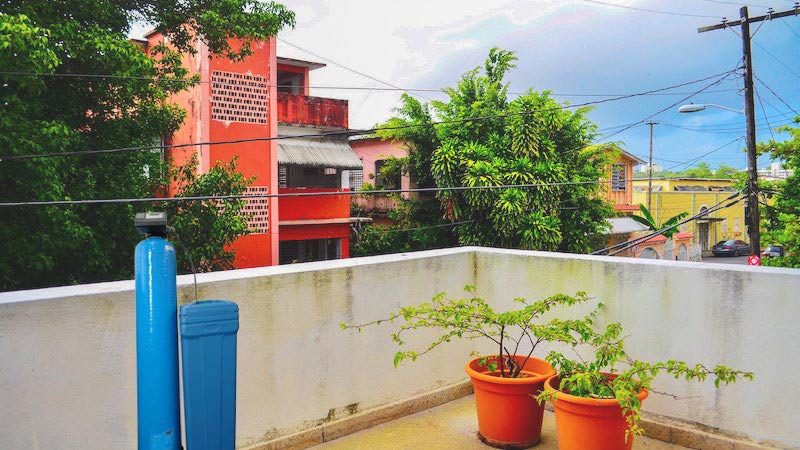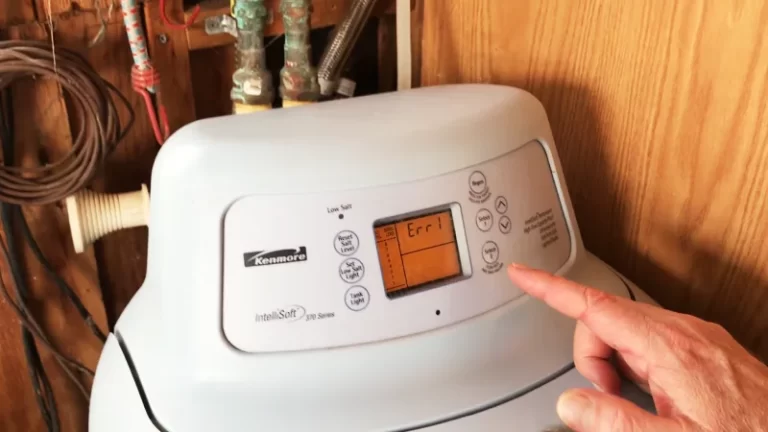Why Should You Use Drainless Water Softener? [Why So Effective? How Do They Work?]

Water softeners are commonly used to remove minerals and other contaminants from the water supply, making it softer and more pleasant to use. These systems work by exchanging hard ions, such as calcium and magnesium, with softer ions, like sodium or potassium.
Traditional water softeners require a drain connection to dispose of the hard ions that are removed from the water.
However, for those who do not have a suitable drain connection, a drainless water softener may be a more practical option. These systems do not require a drain and can still effectively remove minerals and contaminants from the water supply.
Some softeners also have button problem.
Is There a Water Softener That Doesn’t Need Drain?
Drainless water softeners are a type of water treatment system that does not require a drain connection in order to operate. They are designed to remove minerals and other contaminants from the water supply in order to improve its quality and make it softer.
These systems are often used in areas where it is difficult or impossible to install a traditional water softener due to the lack of a suitable drain connection.
Different Types
There are several different types of drainless water softeners available on the market. Some of these systems use filtration methods to remove contaminants from the water, while others use chemical processes to alter the minerals in the water and make it softer.
Some drainless water softeners also use a combination of these methods to provide more effective water treatment.
Does Not Require a Drain Connection
One of the main benefits of using a drainless water softener is that it does not require a drain connection, which makes it easier to install in areas where a drain is not readily available. These systems are also typically more compact and less expensive than traditional water softeners, which makes them a more attractive option for many homeowners.
Overall, drainless water softeners can be a good option for those who live in areas with hard water and are looking for a way to improve the quality of their water without the need for a drain connection.
They are relatively easy to install and maintain and can be an effective way to remove minerals and other contaminants from the water supply.
Why So Effective Drainless Water Softeners?
Drainless water softeners are becoming increasingly popular due to their effectiveness and convenience. These systems do not require a drain connection and use a resin tank to soften hard water. Here are five reasons why drainless water softeners are so effective:
- They are easy to install: Drainless water softeners are relatively simple to install, as they do not require a drain connection. This means that installation can be completed quickly and with minimal disruptions to your home.
- They are highly efficient: Drainless water softeners use a resin tank to soften hard water, which means they are highly efficient at removing minerals such as calcium and magnesium. This results in soft water that is gentle on your skin and hair and helps to protect your plumbing and appliances.
- They are low maintenance: Drainless water softeners are low maintenance and require little upkeep. This means you can enjoy the benefits of soft water without having to worry about regular maintenance tasks.
- They are space-saving: Drainless water softeners are designed to be compact, which means they take up less space in your home. This makes them a great option for those with limited space or for those who want to keep the unit out of sight.
- They are cost-effective: Drainless water softeners are often more cost-effective than other types of water softeners, as they do not require additional plumbing or installation costs. Plus, they can save you money on your water and energy bills in the long run by protecting your appliances and plumbing from hard water damage.
Overall, drainless water softeners are an effective and convenient solution for hard water issues. They are easy to install, highly efficient, low maintenance, space-saving, and cost-effective.
How Drainless Water Softeners Work
There are several different types of drainless water softeners available on the market, each of which uses a different method to remove minerals and contaminants from the water.
Filtration-based
Filtration-based drainless water softeners use a physical filter to remove minerals and other contaminants from the water. These systems typically use a cartridge or other type of replaceable filter that is designed to trap and remove specific contaminants.
Filters may be made of materials like carbon, resin, or ceramic, and may be effective at removing a wide range of contaminants, including sediment, chlorine, and heavy metals.
Chemical Treatment-based
Chemical treatment-based drainless water softeners use chemicals to alter the minerals in the water and make it softer. These systems may use compounds like sodium or potassium to replace hard ions like calcium and magnesium or may use other chemical processes to alter the minerals in the water.
Chemical treatment systems may be more effective at removing certain types of minerals than others and may require frequent maintenance and replacement of chemicals.
Other Softeners
Some drainless water softeners use a combination of filtration and chemical treatment methods to provide more effective water treatment. These systems may use a combination of filters and chemicals to remove a wide range of contaminants from the water supply.
Overall, the effectiveness of a drainless water softener will depend on the specific type of system and the contaminants that need to be removed from the water. It is important to carefully research and compare different drainless water softeners to find the best option for your needs.
Advantages Of Using A Drainless Water Softener
No Drain Connection
One of the main advantages of using a drainless water softener is that it does not require a drain connection, which makes it easier to install in areas where a drain is not readily available. This can be especially useful for those who live in apartments or homes without a suitable drain connection, or for those who do not want to install a drain specifically for a water softener.
Smaller
Drainless water softeners are also typically smaller and more compact than traditional water softeners, which makes them a more practical option for those with limited space. These systems are also generally less expensive to purchase and maintain than traditional water softeners, which can be significant cost savings for homeowners.
Easy to Install
Another advantage of drainless water softeners is their ease of installation and maintenance. These systems typically do not require professional installation and can be easily installed by the homeowner. Maintenance is usually minimal and may involve replacing filters or chemicals on a regular basis, depending on the specific system being used.
Overall, drainless water softeners offer a number of advantages over traditional water softeners, including the lack of a drain connection, compact size, lower cost, and ease of installation and maintenance. These factors make drainless water softeners an attractive option for many homeowners.
Disadvantages Of Using A Drainless Water Softener
While there are many benefits to using a drainless water softener, there are also a few potential disadvantages to consider.
Not So Effective
One of the main drawbacks of these systems is that they may not be as effective at removing minerals from the water as traditional water softeners. This can be due to the type of filtration or chemical treatment method being used, or simply because the system has a smaller capacity for treating water.
As a result, homeowners may need to use larger quantities of the product or may need to use it more frequently in order to achieve the desired level of water softness.
Limited Capacity
Another potential disadvantage of drainless water softeners is their limited capacity for treating large volumes of water. These systems are typically designed to treat a small to moderate volume of water at a time, which may not be sufficient for households with high water usage or for those who need to treat a large volume of water on a regular basis.
Maintaince
Finally, some drainless water softeners may require frequent maintenance or replacement of filters in order to continue operating effectively. This can be time-consuming and may also add to the overall cost of using the system. It is important to carefully research and compare different drainless water softeners to find a system that is both effective and low maintenance.
Why Should You Choose Drainless Water Softener?
Here are a few additional tips for choosing the right drainless water softener:
Consider The Type Of Water Supply You Have
Different drainless water softeners are designed to treat different types of water, so it is important to consider the specific minerals and contaminants present in your water supply when choosing a system. For example, some systems may be more effective at removing calcium and magnesium than others, while others may be better suited for removing iron or other heavy metals.
Determine The Capacity Of The System You Need
Drainless water softeners have a limited capacity for treating water, so it is important to consider the volume of water you need to treat when choosing a system. If you have a large household with high water usage, you may need a larger system with a higher capacity.
Compare The Cost And Maintenance Requirements Of Different Systems
Drainless water softeners can vary significantly in terms of cost and maintenance requirements, so it is important to carefully compare these factors when choosing a system. Consider the upfront cost of the system as well as the ongoing cost of filters or chemicals that may need to be replaced regularly.
Check The Warranty And Return Policy
It is always a good idea to check the warranty and return policy of any product you are considering purchasing, including a drainless water softener. This can provide peace of mind and protection in case the system fails or does not meet your expectations.
Read Reviews And Ask For Recommendations
Before making a purchase, be sure to read reviews from other customers who have used the product and consider asking for recommendations from friends or professionals in the field. This can help you get a sense of the reliability and effectiveness of different drainless water softeners.
Conclusion
In conclusion, drainless water softeners can be a good option for those who live in areas with hard water and are looking for a way to improve the quality of their water without the need for a drain connection. These systems are relatively easy to install and maintain and can be an effective way to remove minerals and other contaminants from the water supply.
However, it is important to be aware of the potential disadvantages of using a drainless water softener, including the possibility of reduced effectiveness at removing minerals, limited capacity for treating large volumes of water, and the need for frequent maintenance or replacement of filters.
Homeowners considering a water treatment system should carefully research and compare different drainless water softeners to find the best option for their needs.
Some tips for choosing the right drainless water softener include considering the specific minerals and contaminants that need to be removed from the water, the capacity and size of the system, and the maintenance requirements of the system.


